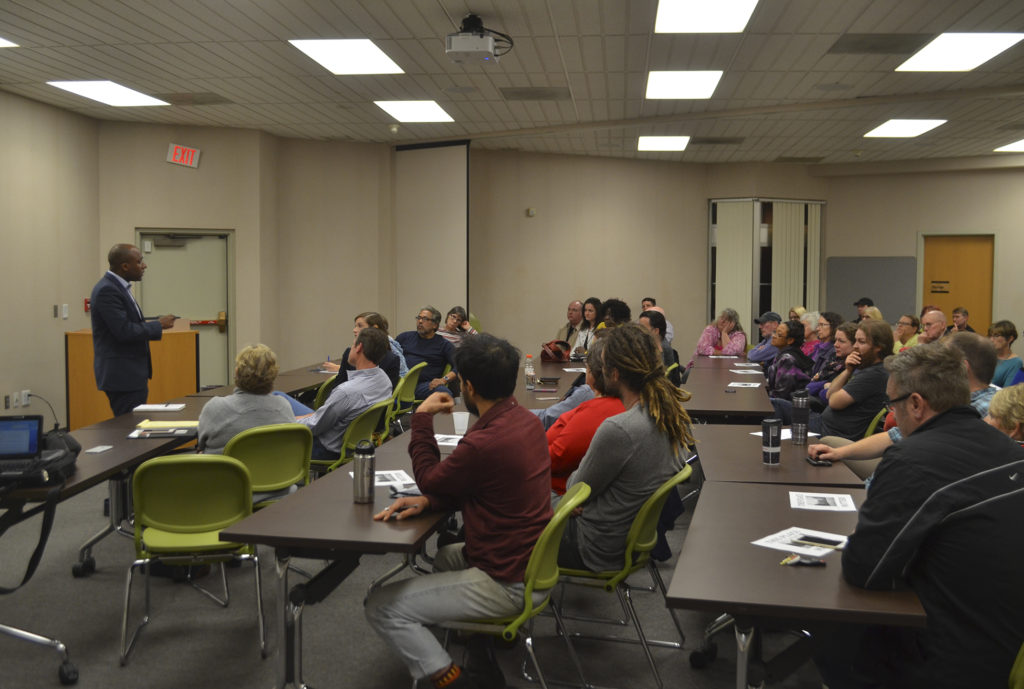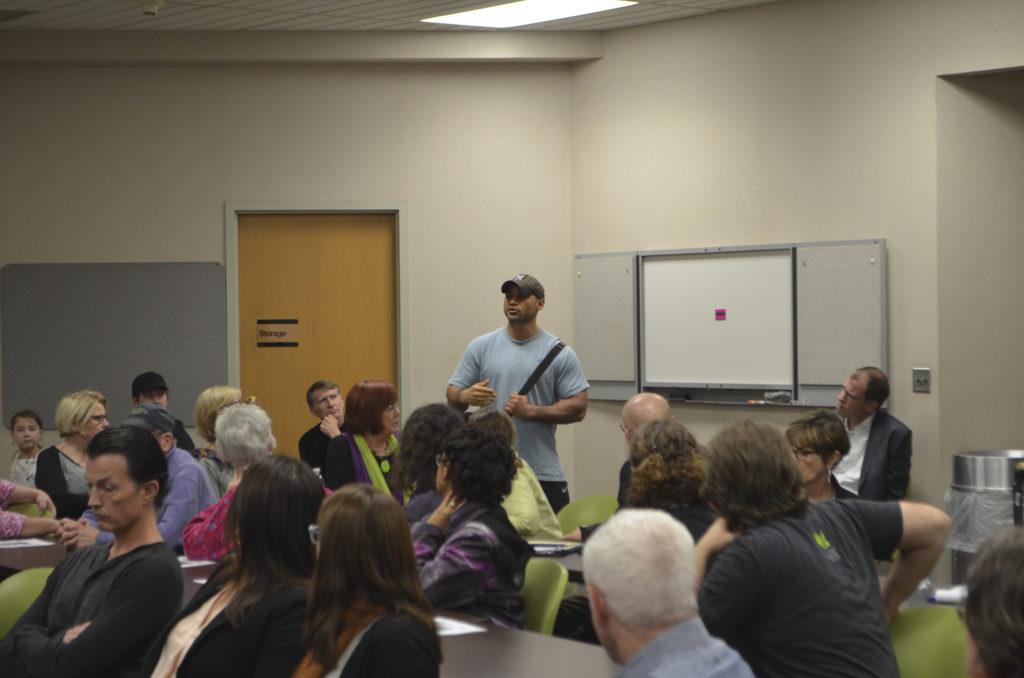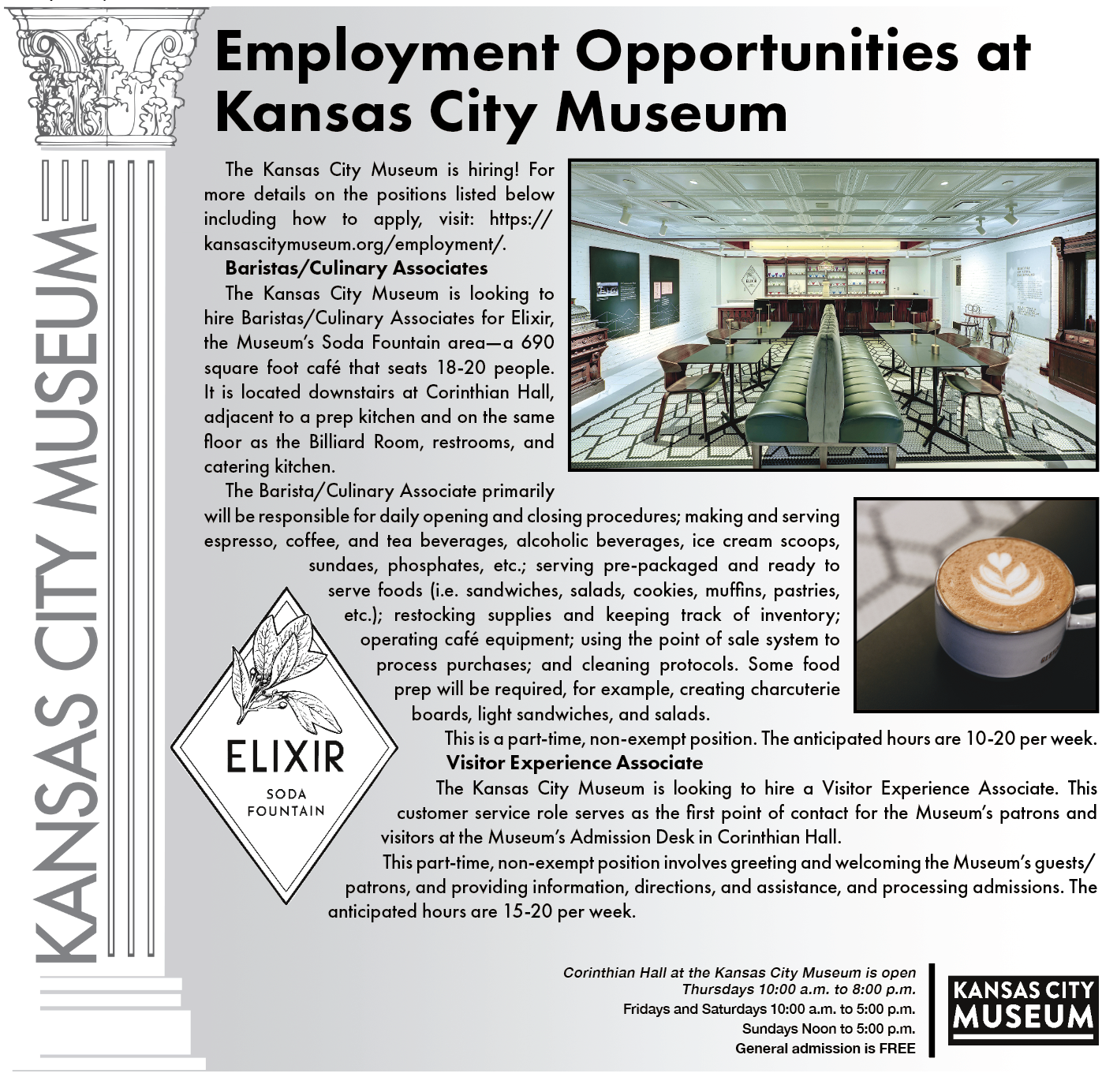Northeast News
February 21, 2017
KANSAS CITY, Missouri – Just days before the issue hits the full City Council, Northeast residents publicly aired concerns on Monday, February 20 about an ordinance that would result in the demolition of the 100-year-old Colonial Court apartments.
The North-East Branch of the Kansas City Public Library opened its doors on President’s Day – despite being closed for the holiday – to host a community conversation regarding Kansas City University’s proposed Master Planned Development (MPD) district, which is scheduled to be heard by the full City Council on Thursday, Feb. 23. 3rd District Councilman Quinton Lucas arranged the meeting, which included fellow Councilwoman Teresa Loar, representatives from Kansas City University, an assortment of neighborhood leaders, and even a former tenant of the now-vacant Colonial Court apartments.
Lucas served as a mediator of sorts during the at-times contentious meeting, first allowing time for KCU Director of Capital Projects Tim Saxe to conduct a brief presentation, and then taking questions from the citizens who had sacrificed their Monday evening to express their concerns. Lucas noted that during the Planning, Zoning, and Economic Development (PZED) committee meeting last week, he intentionally offered a motion that didn’t advance the MPD ordinance to the Feb. 16 City Council meeting. The idea, he added, was to facilitate additional conversation between the University and the community.
“I asked that it not be (advanced) precisely so we could have conversations like this,” said Lucas.
During the two-hour meeting, community concerns covered a variety of topics. One woman asked Saxe what would happen if Woodland Avenue is partially vacated, as is proposed in the MPD ordinance. Of particular concern was how the vacation would affect Della Lamb Community Services, which operates a school at the intersection of Woodland and Missouri Ave. Saxe replied that the preliminary plans focus on two options: 1) turning Woodland into a one-way street traveling southbound; or 2) switching Brownell Ave. from a one-way street into a two-way street. Either option, Saxe said, would essentially mean that Woodland would be primarily utilized by local traffic. Saxe added that Della Lamb is in favor of the vacation, and that to his knowledge, the organization has no plans to move.
“Our expectation is that they are staying,” said Saxe. “They’re thrilled with this. They are whole-heartedly in support of this partial vacation.”
Since Woodland Ave. is located along a city bus route, the route would have to be modified, likely to Maple Blvd., ahead of the vacation. KCU spokesperson Elizabeth Alex confirmed on Feb. 21 that standard City procedures would be followed to alter the route before the vacation takes place.
“KCU will be financially responsible for the related physical modifications required, such as widening of the sidewalk along Independence Ave, and modifying the sewer inlet grates along Maple Blvd.,” wrote Alex in a Feb. 21 email.
Other comments from Saxe drew criticism from attendees. Northeast resident Michael Stringer, for one, took issue with Saxe’s statement that the Colonial Court apartments were on the market for years before KCU was approached to purchase them. Stringer contended that he had seen no indication that the properties were for sale.
“I know of a developer right now who would like to see them tomorrow, if he could,” said Stringer.
Former Colonial Court property manager Ronnie Ross, however, contradicted that notion during a conversation on Tuesday, February 21. Ross said that he didn’t have a problem with KCU purchasing the apartment buildings because the previous owners had let the structures fall into disrepair while attempting to sell it.
“That isn’t the first time they tried to sell it; they’ve been trying to sell it,” said Ross. “They were just going through all kinds of problems.”
Ross further noted that some of the buildings needed significant roof repairs, and that he often had to call 311 in order to conduct basic repairs around the premises. He also said that vermin were a persistent problem.
“When I moved in there, I had to kill 72 mice in my apartment,” said Ross. “Anything you wanted to fix, you had to call 311.”
Another major issue discussed at the meeting was historic preservation, particularly as it relates to precedent. Michael Donnici of Scarritt Renaissance asked Lucas what precedent would be set for other organizations or institutions if KCU’s MPD is approved. Lucas acknowledged that lawyers will likely point to the MPD – and any exemption included therein – when applying for their own special purpose districts, but he added that he doesn’t believe the current ordinance being considered by City Council “gives carte blanche for every development in the future” to tear down historic structures.
Also of note was a discussion about the tenants who were relocated from Colonial Court. Some meeting attendees contested that Colonial Court tenants were hastily evicted from their residences in order to facilitate the sale. While KCU has acknowledged that the apartments were required to be vacant at the time of acquisition, Saxe told attendees that the University extended the closing period by 60 days so that the last remaining tenants of the complex could relocate. KCU officials further confirmed that the school placed $100,000 in escrow in order to cover relocation costs on behalf of displaced Colonial Court tenants. Though former property manager Ross still believes that the buildings could have been saved, he did confirm that the displaced tenants each received $1,000 checks towards relocation costs and were allowed to remain in their apartments until November 29.
The KCMO full City Council is scheduled to consider KCU’s Master Planned Development district on Thursday, Feb. 23 at 3:00 p.m. at City Hall.





















Comments are closed.